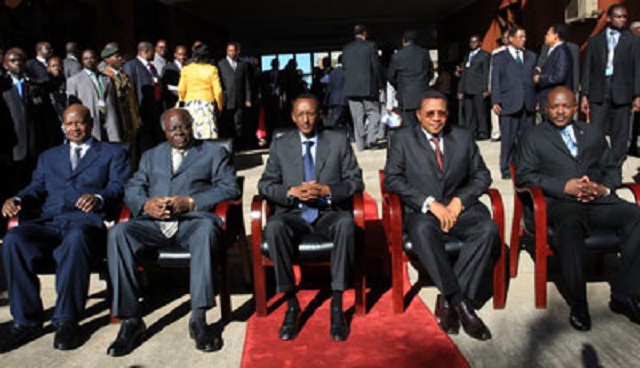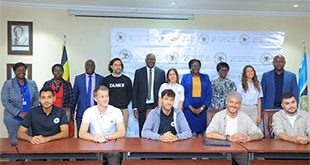
By Joseph Were
Tension over jobs, residence and land
The signing of the East African Common Market protocols in Kampala last month could not have come at a better time for the region.
The African Development Bank (AfDB) is predicting that East Africa may this year record the continent’s best growth.
The Common Market will allow freer movement of services, capital, labour and goods in the five EAC countries of Burundi, Rwanda, Kenya, Uganda, and Tanzania.
Promoters hope that under the Common Market, the EAC which is a Customs Union with a combined population of over 121 million people will be easier to sell as an investment, trade or travel destination instead of a constellation of five tiny and poor countries.
They are predicting that the region could improve its competitiveness, penetrate global markets, and increase intra-regional trade.
According to data from the Export Promotion Council of Kenya, Uganda was Kenya’s top export destination accounting for 12% last year. The UK was second at 10%, Tanzania third at 8% and Sudan 7th at 5%.
Meanwhile, Kenya’s exports to Uganda, were Shs 900 billion (US$ 520.6 million) in 2005 and Shs 700 billion (US$ 401 million) in 2006. Tanzania exports to Uganda were worth US$ 30 million (2005) and US$ 28 million (2006) respectively.
Uganda’s exports to Rwanda were US$ 30.5 (2006) and US$ 83.3 million (2007) and those to Burundi were US$ 20.5 million (2006) and US$ 42.7 million (2007).
Despite the optimism, implementation of the Common Market could prove complicated.
Even after the Common Market protocol signing, the issues of travel documents, land ownership, and the right of residence remain contentious.
Burundi, Kenya, Rwanda and Uganda are agreed on the three issues but Tanzania is opposed to proposals that citizens from other EAC states could own land or be entitled to permanent residency after living in an EAC country for five years.
It also wants east Africans travelling in Tanzania to use passports, although the other states are happy for ID cards to be used as the only form of identification.
As a result, a phased implementation has been agreed for some issues and national laws allowed to operate for others.
‘There are things where people do not want to open up at once, like the local manufacturers who are saying they need more time to catch up with the other economies,’said Abubaker Muhammad K. Moki, the assistant commissioner economic affairs at the Uganda ministry of East African Community Affairs in an interview.
The issue of free movement of workers across borders has also been raised. Tanzania argues that Kenya has more qualified manpower and will dominate the local market.
Uganda meanwhile has for long been open to foreign workers in banking, advertising, oil industry, insurance, capital markets, breweries and media. Tensions over jobs held by foreigners have risen as investors have been free to bring their staff. Statistics show that Ugandan-owned firms create more jobs annually than foreign investors but the government has been criticised for allegedly favouring foreign-owned firms.
Job tensions are, however, not unique to Uganda. Under the 1997 Investment Act, foreign investors in Tanzania are allowed to bring in not more than five senior managerial position expatriates as part of their investment.
Across the isle, however, Rwanda has eliminated the requirement of work permits while Kenya has removed the requirement for Rwandans.
In an earlier interview, the Minister of Information, Communication Technology Aggrey Awori told The Independent that the influx of foreigners is likely to increase with the Common Market.
‘People will bring their own to manage,’ he said,†If we don’t work hard, we will be left out.’
Awori said for any federation to be meaningful, member governments should not put restrictions on movement of labour but enact laws on how investors should employ locals.
Margaret Kigozi, the executive director of the Uganda Investment Authority (UIA) says, however, that according to a report done jointly with the World Bank only 0.04% of workers in Uganda is foreign or expatriates.
Despite the tensions and bouyed by recent successes, the assistant commissioner economic affairs at the Uganda ministry of East African Community Affairs, Abubaker Muhammad K. Moki, told The Independent that as soon as the Common Market comes into effect on January 10 next year, the regional negotiators will start work on a monetary union. This will involve having a common market with a single currency.
“Monetary Union is expected to be completed by 2012,” he said, ‘after, that will be followed by the protocol on East African Federation.’
 The Independent Uganda: You get the Truth we Pay the Price
The Independent Uganda: You get the Truth we Pay the Price


